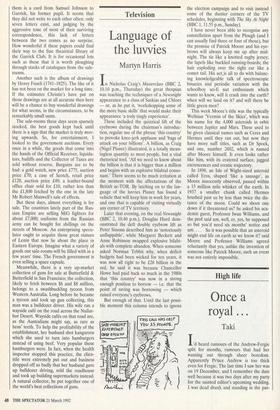Television
Language of the luwies
Martyn Harris
In Nicholas Craig's Masterclass (BBC 2, 10.10 p.m., Thursday) the great thespian was teaching the techniques of a Newsnight appearance to a class of Saskias and Chloes — or, as he put it, `workshopping some of the more basic skills' that would make their appearance 'a truly tingly experience'.
These included the quizzical lift of the eyebrows during the chairman's introduc- tion, regular use of the phrase 'this country' to provoke knee-jerk applause and 'bags of attack on your billions'. A billion, as Craig (Nigel Planer) illustrated, is a totally mean- ingless quantity to most people, but a vital rhetorical tool. 'All we need to know about the billion is that it is bigger than a million and begins with an explosive bilabial conso- nant.' There seems to be much irritation at the moment with the affectations of the British ac-TOR. By latching on to the lan- guage of the luwies Planer has found a vehicle that will keep him in work for years, and one that is capable of visiting virtually any corner of TV territory.
Later that evening, on the real Newsnight (BBC 2, 10.40 p.m.), Douglas Hurd dem- onstrated the deft double eyebrow lift as Peter Sissons described him as 'notoriously unflappable', while Margaret Beckett and Anne Robinson swapped explosive bilabi- als with complete abandon. When someone asked Norman Tebbit why, when deficit budgets had been wicked for ten years, it was now all right to be £28 billion in the red, he said it was because Chancellor Howe had paid back so much in the 1980s that 'this country' was now in a strong enough position to borrow — i.e. that the point of saving was borrowing — which raised everyone's eyebrows.
But enough of that. Until the last possi- ble moment this column intends to ignore
the election campaign and to visit instead some of the dustier corners of the TV schedules, beginning with The Sky At Night (BBC 1, 11.55 p.m., Sunday).
I have never been able to recognise any constellation apart from the Plough (and I can usually find three or four of those), but the promise of Patrick Moore and his eye- brows will always keep me up after mid- night. The tie like a knotted rugby jersey; the lapels like buckled running-boards; the hair exploding over the right ear like a comet tail. His act-is all to do with balanc- ing knowledgeable talk of spectroscopic binaries and periodic variation with the schoolboy sci-fi nut enthusiasm which wants to know, will it crash into the earth? when will we land on it? and will there be little green men?
This week Moore's title was the typically Wellsian 'Vermin of the Skies', which was his name for the 4,000 asteroids in orbit between Jupiter and Mars. These used to be given classical names such as Ceres and Hermes until they ran out, but now they have more naff titles, such as Dr Spock, and one, number 2602, which is named after Moore himself. It even looks rather like him, with its cratered surface, jagged excrescences and erratic trajectory.
In 1898, an Isle of Wight-sized asteroid called Eros, shaped 'like a sausage', as Moore innocently observed, passed within a 15 million mile whisker of the earth. In 1937 a smaller chunk called Hermes brushed past us by less than twice the dis- tance of the moon. Could we shoot one down if it threatened us? he asked his aca- demic guest, Professor Iwan Williams, and the prof said urn, well, er, yes, he supposed so but you'd need six months' notice and urn. . . . So it was possible that an asteroid might end life on earth as we know it? said Moore and Professor Williams agreed reluctantly that yes, unlike the invention of someone like Patrick Moore, such an event was not entirely impossible.


























































 Previous page
Previous page